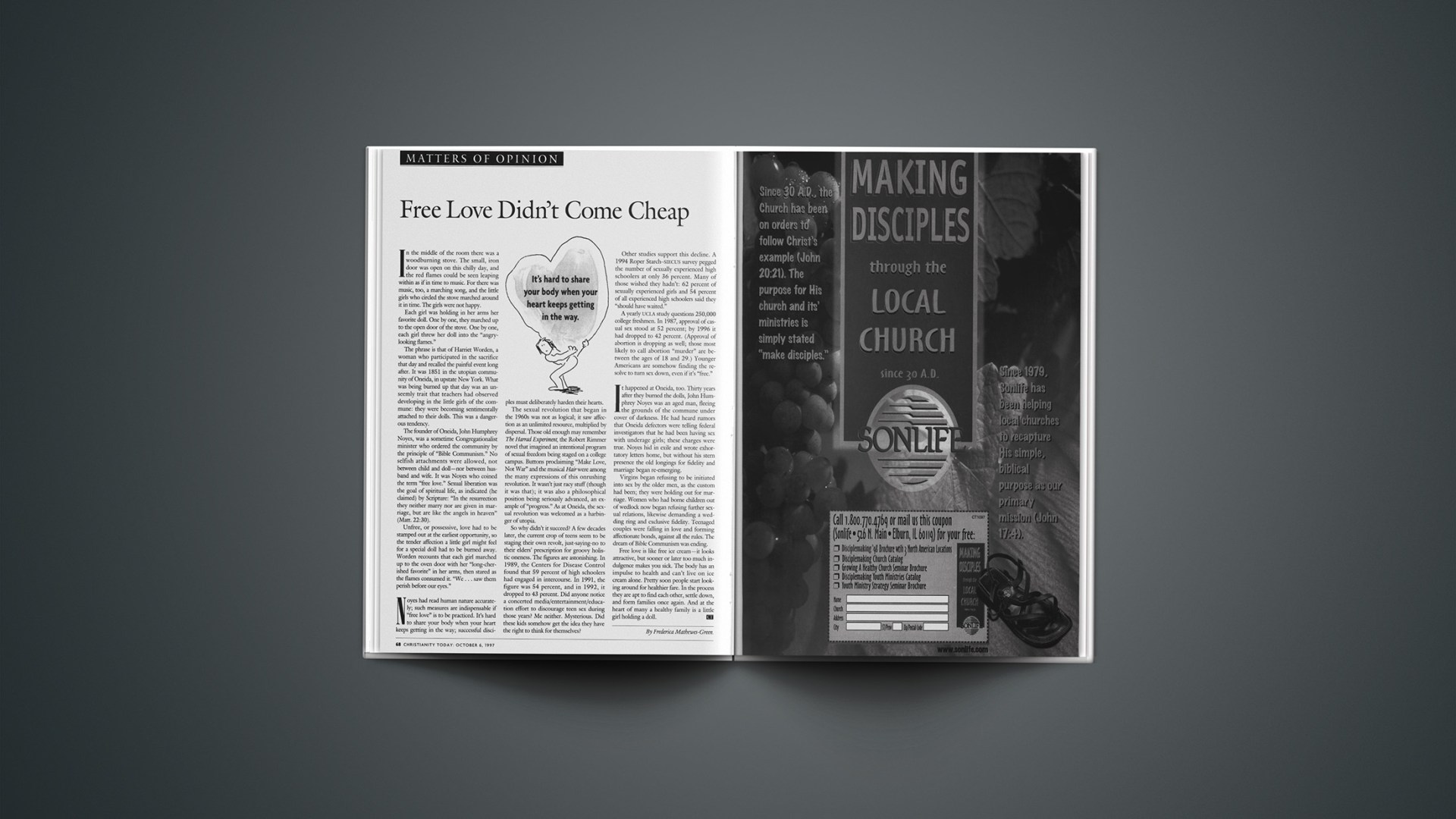In the middle of the room there was a woodburning stove. The small, iron door was open on this chilly day, and the red flames could be seen leaping within as if in time to music. For there was music, too, a marching song, and the little girls who circled the stove marched around it in time. The girls were not happy.
Each girl was holding in her arms her favorite doll. One by one, they marched up to the open door of the stove. One by one, each girl threw her doll into the “angry-looking flames.”
The phrase is that of Harriet Worden, a woman who participated in the sacrifice that day and recalled the painful event long after. It was 1851 in the utopian community of Oneida, in upstate New York. What was being burned up that day was an unseemly trait that teachers had observed developing in the little girls of the commune: they were becoming sentimentally attached to their dolls. This was a dangerous tendency.
The founder of Oneida, John Humphrey Noyes, was a sometime Congregationalist minister who ordered the community by the principle of “Bible Communism.” No selfish attachments were allowed, not between child and doll—nor between husband and wife. It was Noyes who coined the term “free love.” Sexual liberation was the goal of spiritual life, as indicated (he claimed) by Scripture: “In the resurrection they neither marry nor are given in marriage, but are like the angels in heaven” (Matt. 22:30).
Unfree, or possessive, love had to be stamped out at the earliest opportunity, so the tender affection a little girl might feel for a special doll had to be burned away. Worden recounts that each girl marched up to the oven door with her “long-cherished favorite” in her arms, then stared as the flames consumed it. “We … saw them perish before our eyes.”
Noyes had read human nature accurately; such measures are indispensable if “free love” is to be practiced. It’s hard to share your body when your heart keeps getting in the way; successful disciples must deliberately harden their hearts.
The sexual revolution that began in the 1960s was not as logical; it saw affection as an unlimited resource, multiplied by dispersal. Those old enough may remember The Harrad Experiment, the Robert Rimmer novel that imagined an intentional program of sexual freedom being staged on a college campus. Buttons proclaiming “Make Love, Not War” and the musical Hair were among the many expressions of this onrushing revolution. It wasn’t just racy stuff (though it was that); it was also a philosophical position being seriously advanced, an example of “progress.” As at Oneida, the sexual revolution was welcomed as a harbinger of utopia.
So why didn’t it succeed? A few decades later, the current crop of teens seem to be staging their own revolt, just-saying-no to their elders’ prescription for groovy holistic oneness. The figures are astonishing. In 1989, the Centers for Disease Control found that 59 percent of high schoolers had engaged in intercourse. In 1991, the figure was 54 percent, and in 1992, it dropped to 43 percent. Did anyone notice a concerted media/entertainment/education effort to discourage teen sex during those years? Me neither. Mysterious. Did these kids somehow get the idea they have the right to think for themselves?
Other studies support this decline. A 1994 Roper Starch-SIECUS survey pegged the number of sexually experienced high schoolers at only 36 percent. Many of those wished they hadn’t: 62 percent of sexually experienced girls and 54 percent of all experienced high schoolers said they “should have waited.”
A yearly UCLA study questions 250,000 college freshmen. In 1987, approval of casual sex stood at 52 percent; by 1996 it had dropped to 42 percent. (Approval of abortion is dropping as well; those most likely to call abortion “murder” are between the ages of 18 and 29.) Younger Americans are somehow finding the resolve to turn sex down, even if it’s “free.”
It happened at Oneida, too. Thirty years after they burned the dolls, John Humphrey Noyes was an aged man, fleeing the grounds of the commune under cover of darkness. He had heard rumors that Oneida defectors were telling federal investigators that he had been having sex with underage girls; these charges were true. Noyes hid in exile and wrote exhortatory letters home, but without his stern presence the old longings for fidelity and marriage began re-emerging.
Virgins began refusing to be initiated into sex by the older men, as the custom had been; they were holding out for marriage. Women who had borne children out of wedlock now began refusing further sexual relations, likewise demanding a wedding ring and exclusive fidelity. Teenaged couples were falling in love and forming affectionate bonds, against all the rules. The dream of Bible Communism was ending.
Free love is like free ice cream—it looks attractive, but sooner or later too much indulgence makes you sick. The body has an impulse to health and can’t live on ice cream alone. Pretty soon people start looking around for healthier fare. In the process they are apt to find each other, settle down, and form families once again. And at the heart of many a healthy family is a little girl holding a doll.
Copyright © 1997 Christianity Today. Click for reprint information.










